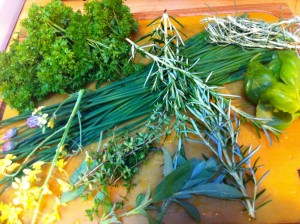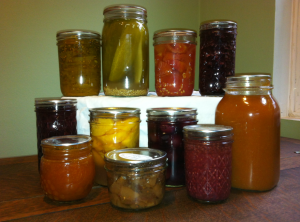Saving money on your food budget is easy with a little strategy and planning. These are some of my favorite, easy tips. What else would you add to this list?
- Use a grocery list. Money mentor, Emily Zillig, says “Grocery stores have put a lot of research into creating impulse purchases.” Shop with intention by planning out what you’ll need for the week, and then stick to the plan.
- Plan in advance. Katie Damon, RD in Reno, Nevada, recommends that you plan your menu in advance so that “you know exactly what you will need. Also, get to know your neighbors, farmers, and ranchers. We get eggs and meat from people we know for less.” You can use online menu planners, such as E-Meals or Saving Dinner.
- Buy in bulk. Foods are less expensive at the bulk bin, thanks largely to less packaging. Because there is less waste, since you aren’t throwing away a bunch of packing as soon as you get home. Also, some places let you bring your own containers to refill, which can earn you a small discount.
- Purchase directly from the farmer or butcher, in bulk. Often, a few families will share in the cost of a large cow, freeze the meat, and eat off of it for months (or years). If you understand how to age and preserve your own meat, you’ll also save money by doing that yourself.
- Grow your greens. Not only are greens really easy to grow, but they are cost-effective too. Greens cost a lot per pound in the grocery store, and most of them are also highly sprayed. By growing your greens, you have more control of the quality, at a fraction of the cost.
16 easy ways to save money on your #grocery bill. What would you add to the list? #budget http://t.co/u3ppelSCxF
— Frances Arnold (@FrancesLArnold) January 4, 2014
 Grow your herbs. They are pennies on the dollar, and most herbs are very easy to grow. Try starting with rosemary, mint, sage, thyme, and oregano. They are extremely nourishing, as well as delicious.
Grow your herbs. They are pennies on the dollar, and most herbs are very easy to grow. Try starting with rosemary, mint, sage, thyme, and oregano. They are extremely nourishing, as well as delicious.- Preserve the fresh herbs you grew or purchased bought before they spoil in your fridge. Chop them up, put them into ice cube trays, and drizzle olive oil, butter, or water over them. When they’ve hardened, put them into freezer baggies. This offers a fast way to season your meals later.
 Learn to preserve. With food preservation skills, you can purchase foods in their peak season (and lowest price), and preserve them to enjoy all year round. Check out my interviews on food preservation here.
Learn to preserve. With food preservation skills, you can purchase foods in their peak season (and lowest price), and preserve them to enjoy all year round. Check out my interviews on food preservation here.
- The Art of Fermentation, Interview with Sandor Katz
- Preserve the Season’s Harvest, Interview with Carrie Kenner
- An Interview With a Home Canning Expert
- Buy frozen or canned foods. Frozen and canned foods are often picked at the peak of their freshness. They are then quickly frozen or canned to preserve flavor. Just take care that you are only buying the vegetable or fruit, not added sugars, added flavors, MSG or other additives. The ingredients should be simple.
- Make your own broth and bouillon. Bouillon and broth are expensive to buy. And the very ingredients used to make broth are what you’re throwing away in your kitchen. You can use vegetable scraps that you were tossing out to make a vegetable broth. The chicken carcass from last night’s supper? Simmer it gently in water and 1 tbsp of vinegar. This helps to extract minerals from the bones, and this is a high-quality multivitamin.
 Shift your perspective. You either pay a little more money now for better health outcomes in the long-term. Or you pay later, with doctor bills and prescription medications. While it can’t be guaranteed that eating healthy will prevent all health ailments, it sure does go a long way to reducing your risks of multiple health problems. The choice is whether you will pay a little more on healthy items now, or pay later with poor health, reduced quality of life, and more sick time spent away from your career and family. (The answer should be easy.) =-)
Shift your perspective. You either pay a little more money now for better health outcomes in the long-term. Or you pay later, with doctor bills and prescription medications. While it can’t be guaranteed that eating healthy will prevent all health ailments, it sure does go a long way to reducing your risks of multiple health problems. The choice is whether you will pay a little more on healthy items now, or pay later with poor health, reduced quality of life, and more sick time spent away from your career and family. (The answer should be easy.) =-)- Buy foods that are in season in your area. Not only will they cost less, they also taste better, are at their peak nutrition content and have a lower carbon footprint. Strategize by buying big and have an action plan to preserve. To name a few ideas, 1.) Stock up on berries during peak season, wash, prepare and freeze 2.) Snag up the winter squash during the fall harvest and store it in is a cool, dry place for 1-3 months (make sure to research the storage requirements for the exact squash you have), 3.) Chef Keith Snow at www.harvesteating.com provides abundant information on how to select food at it’s peak harvest and different methods to preserve it for later use.
- Make your own baby food. Baby food is expensive, and the nutrition isn’t fresh. Until recent times, parents made their own baby food without a lot of fuss. In fact, it can be a lot of fun! Endless recipes exist for delicious baby food recipes. Your baby will enjoy fresher foods, better nutrition, and as parents, you will have saved a lot of money.
- Seek out the mark-down items. At our local farmer’s market, we recently bought a giantly sweet melon from the “eat now” bin at our farmer’s market for $2. At the regular grocery store, it cost $8 for one half the size. I was blown away!! Sharon Vincello, a fan on our Facebook page, said, “At our co-op, the organic fruit gets marked down at night (30% off grapes and cantaloupe last time) when it is about to turn/go bad soon. When we see these deals we snag them up . . . For lunch each day I’m able to pack a cup of fruit salad with me for cheap!” You could also preserve these mark-downs (see above for suggestions).
- Stop buying processed foods. Processed food really is expensive. Not only is the food nutrient-poor, but it actually costs you nutrition to eat it. Processed sugar, preservatives, and food coloring are just a few of the ingredients in cheap foods that actually remove minerals and vitamins from your body in order to process it. And they leave you feeling less satisfied than a meal that would deliver you real nourishment.
- Learn to value cooking at home over eating out. Hone your cooking skills so that you feel good about preparing foods at home. Part of good nutrition is having a good relationship with your food. The more you cook at home, the more you are in control of the healthy ingredients going into your body. Cooking at home costs fractions of what it does to purchase pre-made foods of comparable quality.
What else would you add to this list?


10 responses to “Easy Ways to Save Money On Your Grocery Bill”
Stock up on nonperishables when they’re on sale. Maybe I’m the last person on earth to figure this out, but cans of beans and soup and tuna, etc, last a long time, and you can always make a quick dinner at home when you’re stocked up. Fill your pantry when they’re on sale.
I completely agree about growing fresh herbs. I even did this when I lived in Manhattan (windowsill garden). What a money-saver and SO much better than dried.
Good tip, J. Doe! You’re totally right that stocking up while non-perishables are on sale is KEY. The trick is to then use them, as while they last a long time, it’s not forever. =-)
2 things I would add: as J Doe mentioned above buy stock times whenever they are on sale. It really s/$&s when you have to pay full price for a jar of mayo! Second is factor in regular “pantry meals”. Once a month I dig through the pantry and pull out all those little impulse buys or bulk things and cook only what I have in the house that week. It’s kinda fun and interesting what you whip up when you find a can of green chilies, a box of corn bread and tortellini!
These are good ideas, Kelly. And I agree: it’s fun to whip out an delicious meal with random ingredients. Those are sometimes the most delicious meals!
Love this list- there are some of these items I have mastered, some I have yet to master, but it feels good knowing I’m on the right track! Happy New Year, Frances!
Yay, Brianna! Keep working it! Happy New Year to you, too.
This is a great one! I echo the comments above. I am trying to hone a system for our groceries. My hope? To get our grocery bill around $400/month for a family of 3, without compromising on buying organic and local, and supporting brands I believe in. Wish us luck!!
That is an awesome goal, Kate! I think you can do it! Let me know how this goes for you, and then teach me what you’ve learned!!
My spouse and I absolutely love your blog and find a lot of your post’s to
be just what I’m looking for. Does one offer guest writers to write content for yourself?
I wouldn’t mind writing a post or elaborating on most of the subjects you write regarding here.
Again, awesome web site!
Yep, I’d love to have a guest writer! I’ll email you.